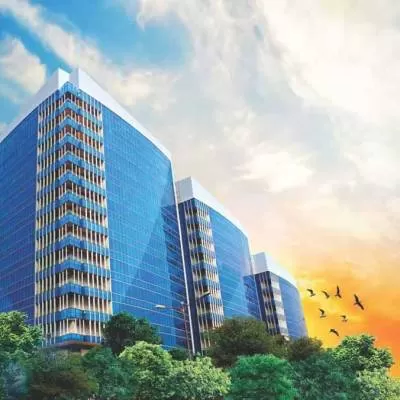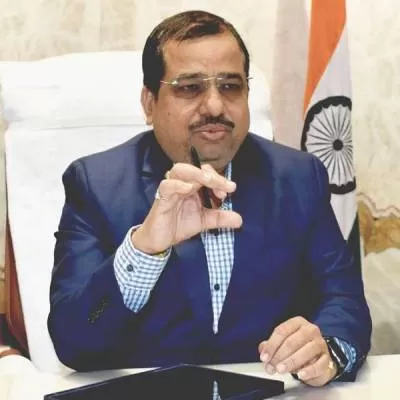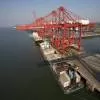- Home
- Real Estate
- Today´s Employees, Tomorrow´s Leaders

Today´s Employees, Tomorrow´s Leaders
The mark of a good organisation is when it trains employees to become leaders. Responsible employers groom their employees to take up leadership roles that see them grow along with their companies. It gives them a meaningful stake in the organisation´s growth and success. After all, corporate well-being is as much about employees as it is about employers.
Nowhere is this more relevant than in the Indian real-estate industry, which owes its stupendous growth and development, in recent years, to its most valuable asset: Human resource. As a leading real-estate developer, we have realised the importance of a leadership development programme and its impact on productivity. To this end, Marathon Group, known for its revolutionary initiatives in real estate, has devised several development programmes to train and engage its employees in line with the company´s Vision 17. The highlight of this initiative is our Next Generation Leader Programme that focuses on creating and transforming today´s employees into leaders of tomorrow.
Next generation leader programme
The programme has been designed to nurture young leaders who can achieve the organisation´s immediate and future goals and targets. The objective is to widen their tunnel vision, enhance their understanding of themselves and other functions, provide a macro-understanding of the business, prepare them to face real-world challenges, and lead people to achieve results in the most efficient manner.
Marathon Group partnered with Hays Group, an international HR consulting firm, who delivered the first edition of the programme ´Next Generation Leader I´ for senior leaders as part of the larger transformation exercise in 2012-13. The second edition of the programme, ´Next Generation Leader II´ (NGL-II), was initiated in December 2014. It was designed in house by the HR team to achieve the objective of developing the second-line leaders of Marathon Group.
Second edition
NGL-II includes 25 employees at the level of managers and senior managers with 10-15 years of experience. They belong to various departments, including sales and marketing, customer care, human resource, IT, administration, accounts, and project departments such as planning, contracts, estimation, procurement, facility management and sites. The most striking feature of the NGL-II programme is its ´3E´ philosophy - experience, education and exposure - that served as a guide to employ various developmental experiences and maximise the effectiveness of the learning. A 360o feedback and psychometric tool OPQ helped identify development areas of each leader. Personal development plans were created along with immediate managers with the help of an external coach.
The leaders of this programme have been working in cross-functional teams of six to eight on one of the four projects linked to organisation priorities and challenges:
- Customer experience.
- Create and implement sales and execution plans for an upcoming project of the company.
- Optimise resources.
- Improve quality.
An innovative element of the NGL-II programme is the application of ´Lean´ as a philosophy or concept (see the above box) to drive these projects as well as provide newer experiences from a development perspective. Training programmes were conducted every quarter and leaders were exposed to various lean concepts such as value stream mapping, work sampling, 5S, Kanban and poka-yoke, last planner system and sig sigma. External lean experts conducted the training and supported the teams in implementing lean tools in their respective projects. This was supplemented by group coaching by an external coach to increase positive team dynamics and enhance their emotional intelligence. Project sponsors, the managing director and chairman reviewed the progress on projects and development of leaders on a regular basis - demonstrating commitment to this initiative and providing essential support and feedback to these leaders in their journey.
The results
The programme resulted in the implementation of several new cost-saving, quality, process improvement, and customer satisfaction initiatives. It helped the organisation identify changes at the operational level, which led to savings in resources such as manpower, machine, money and material. One of the teams focused on identifying several touch-points across the customer´s journey and came up with a series of initiatives aimed at improving customer experiences from pre-sales to post-possession. The programme helped participants understand the importance of being first-time right in finishing areas.
Several new methods and tools were introduced after studying practices at sites, which are now used by the company.
The organisation was successful in devising a sales and execution plan for a company project, after a detailed survey of business competition in catchment areas. Thus, in-depth research became elemental in product planning and preparing the sales and marketing strategy for project launch. This is expected to serve as a roadmap for product planning and new project launches in future for Marathon Group.
In conclusion
The NGL-II programme has been running successfully. The organisation has achieved higher operational efficiency and better utilisation of resources in various areas, which in turn has increased overall productivity. Leaders have improved inter-departmental functioning, made changes in their management styles, and demonstrated openness in their thinking. A culture of innovative thinking and continuous improvement has evolved among this set of leaders.
The results of the Next Generation Leader Programme have been encouraging and they have inspired us to bring more and more employees within its ambit in the coming years.
The importance of ´Lean´
Lean is primarily a management philosophy, or a business concept, for achieving more with fewer resources. It includes greater flexibility of the organisation with shorter lead time, where the focus is on the customer. The prerequisite of the lean concept is dedicated commitment from every participant. The ultimate goal is to provide perfect value to the customer through a perfect value creation process that has zero waste.
The concept has been popular with the manufacturing sector but has probably never been used in the real-estate sector before. Lean applies in every business and every process. It is not a tactic or a cost-reduction programme, but a way of thinking and acting for an entire organisation. Lean implementation is, therefore, focused on getting the right things to the right place at the right time and in the right quantity so as to achieve perfect workflow, minimise waste, and be flexible to change.
For the first time, Marathon Group has used this concept as part of its leadership programme.
About the author:
Mayur Shah is Managing Director of Marathon Group.
MAYUR SHAH writes on the importance of a leadership development programme and its impact on productivity. The mark of a good organisation is when it trains employees to become leaders. Responsible employers groom their employees to take up leadership roles that see them grow along with their companies. It gives them a meaningful stake in the organisation´s growth and success. After all, corporate well-being is as much about employees as it is about employers. Nowhere is this more relevant than in the Indian real-estate industry, which owes its stupendous growth and development, in recent years, to its most valuable asset: Human resource. As a leading real-estate developer, we have realised the importance of a leadership development programme and its impact on productivity. To this end, Marathon Group, known for its revolutionary initiatives in real estate, has devised several development programmes to train and engage its employees in line with the company´s Vision 17. The highlight of this initiative is our Next Generation Leader Programme that focuses on creating and transforming today´s employees into leaders of tomorrow. Next generation leader programme The programme has been designed to nurture young leaders who can achieve the organisation´s immediate and future goals and targets. The objective is to widen their tunnel vision, enhance their understanding of themselves and other functions, provide a macro-understanding of the business, prepare them to face real-world challenges, and lead people to achieve results in the most efficient manner. Marathon Group partnered with Hays Group, an international HR consulting firm, who delivered the first edition of the programme ´Next Generation Leader I´ for senior leaders as part of the larger transformation exercise in 2012-13. The second edition of the programme, ´Next Generation Leader II´ (NGL-II), was initiated in December 2014. It was designed in house by the HR team to achieve the objective of developing the second-line leaders of Marathon Group. Second edition NGL-II includes 25 employees at the level of managers and senior managers with 10-15 years of experience. They belong to various departments, including sales and marketing, customer care, human resource, IT, administration, accounts, and project departments such as planning, contracts, estimation, procurement, facility management and sites. The most striking feature of the NGL-II programme is its ´3E´ philosophy - experience, education and exposure - that served as a guide to employ various developmental experiences and maximise the effectiveness of the learning. A 360o feedback and psychometric tool OPQ helped identify development areas of each leader. Personal development plans were created along with immediate managers with the help of an external coach. The leaders of this programme have been working in cross-functional teams of six to eight on one of the four projects linked to organisation priorities and challenges: Customer experience. Create and implement sales and execution plans for an upcoming project of the company. Optimise resources. Improve quality. An innovative element of the NGL-II programme is the application of ´Lean´ as a philosophy or concept (see the above box) to drive these projects as well as provide newer experiences from a development perspective. Training programmes were conducted every quarter and leaders were exposed to various lean concepts such as value stream mapping, work sampling, 5S, Kanban and poka-yoke, last planner system and sig sigma. External lean experts conducted the training and supported the teams in implementing lean tools in their respective projects. This was supplemented by group coaching by an external coach to increase positive team dynamics and enhance their emotional intelligence. Project sponsors, the managing director and chairman reviewed the progress on projects and development of leaders on a regular basis - demonstrating commitment to this initiative and providing essential support and feedback to these leaders in their journey. The results The programme resulted in the implementation of several new cost-saving, quality, process improvement, and customer satisfaction initiatives. It helped the organisation identify changes at the operational level, which led to savings in resources such as manpower, machine, money and material. One of the teams focused on identifying several touch-points across the customer´s journey and came up with a series of initiatives aimed at improving customer experiences from pre-sales to post-possession. The programme helped participants understand the importance of being first-time right in finishing areas. Several new methods and tools were introduced after studying practices at sites, which are now used by the company. The organisation was successful in devising a sales and execution plan for a company project, after a detailed survey of business competition in catchment areas. Thus, in-depth research became elemental in product planning and preparing the sales and marketing strategy for project launch. This is expected to serve as a roadmap for product planning and new project launches in future for Marathon Group. In conclusion The NGL-II programme has been running successfully. The organisation has achieved higher operational efficiency and better utilisation of resources in various areas, which in turn has increased overall productivity. Leaders have improved inter-departmental functioning, made changes in their management styles, and demonstrated openness in their thinking. A culture of innovative thinking and continuous improvement has evolved among this set of leaders. The results of the Next Generation Leader Programme have been encouraging and they have inspired us to bring more and more employees within its ambit in the coming years. The importance of ´Lean´ Lean is primarily a management philosophy, or a business concept, for achieving more with fewer resources. It includes greater flexibility of the organisation with shorter lead time, where the focus is on the customer. The prerequisite of the lean concept is dedicated commitment from every participant. The ultimate goal is to provide perfect value to the customer through a perfect value creation process that has zero waste. The concept has been popular with the manufacturing sector but has probably never been used in the real-estate sector before. Lean applies in every business and every process. It is not a tactic or a cost-reduction programme, but a way of thinking and acting for an entire organisation. Lean implementation is, therefore, focused on getting the right things to the right place at the right time and in the right quantity so as to achieve perfect workflow, minimise waste, and be flexible to change. For the first time, Marathon Group has used this concept as part of its leadership programme. About the author: Mayur Shah is Managing Director of Marathon Group.




















